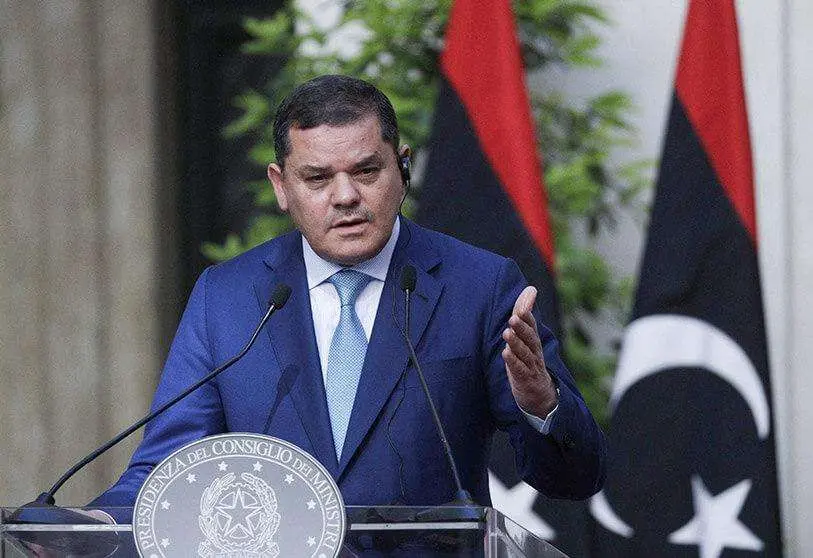Libyan prime minister faces no-confidence motion

Since the uprising against Muammar Gaddafi in 2011, Libya has been plunged into instability. Libya has been a failed state, a victim of chaos and civil war, since 2011, when NATO contributed militarily to the victory of the heterogeneous rebel groups over the dictatorship of Muammar al-Qadhafi. After a brief political transition, the country split in two following the outgoing parliament's decision not to recognise the election results and to relocate to the eastern city of Tobrouk.
After a failed UN-led dialogue process, the international community imposed a Government of National Accord (GNU) in Tripoli, which clashed with the east and triggered a civil war in which more than 8,000 people were killed and different militias fought, supported by Russian mercenaries in the east and by Turkey and Syrian soldiers of fortune in the west.
In 2019, Moscow and Ankara, the two regimes most influential in Libya's multinational conflict - the first fully privatised conflict of the modern era - reached a ceasefire that ushered in a new UN-sponsored reconciliation process, from which the current government emerged with the mission of preparing for elections on 24 December.

Despite progress towards a political solution for Libya after a decade of violence and chaos, most of the country is still controlled by armed groups, corruption is rampant and external powers involved in the conflict have not withdrawn. Since last March, power has been in the hands of the National Unity Government (GNU), elected by the Forum for Political Dialogue in Libya (FDPL), outside the governments that had been at loggerheads until then, which must unify the country, maintain the ceasefire and lead it until the next elections.
These elections would be a major step in international efforts to establish security and peace in the North African country, where many armed groups still hold power in the territory. However, the possibility that these elections, which would be a major turning point in Libya's situation, could be postponed would mean a stalemate in the peace process.
Libya's acting prime minister, Abdul Hamid Dbeiba, has categorically rejected a proposal by nearly 30 MPs to push through a no-confidence motion against his government, in a clash with the legislature that threatens to block plans to hold elections in the country by the end of the year. Dbeiba, who took office in March, said parliament's reasons for not approving his repeated budget proposals were "unrealistic and flimsy" and blamed the body for obstructing elections planned for December.

The budget dispute has emerged as a central element in the growing friction between rival political factions that has undermined a UN-backed process seen as the best chance the country has had in years to end the path of conflict.
Dbeiba sees the passage of the budget as crucial to saving the country from the energy crisis in which it is still mired, in part because of the destruction of electricity infrastructure during the conflict. "This would be solved if the budget had been approved. In ten years we have spent nothing on projects, stations and the electricity grid," he said.
Threats to stability remain. The main challenge is whether to hold direct presidential and parliamentary elections simultaneously or to allow the elected parliament to choose the president. Another question is the eligibility requirements for candidates.
Parliamentary speaker Aguila Salé demanded that Dbeiba appear before the chamber, elected in 2014, to be questioned on his government's performance or face a vote of no confidence, assuring that if Libya's incumbent prime minister does not show up for the scheduled scrutiny session, he himself will call for a motion of no confidence against him for disrespecting the chamber.

A group of 27 members of the Libyan parliament based in the eastern city of Tobrouk also called for the withdrawal of confidence from the National Unity Government. In a statement released to the media, the deputies demanded that this measure be adopted in the control session called for Monday in view of the "irresponsible behaviour of Prime Minister Abdul Hamid Dbeiba, who is controlled by the corrupt and their political money". The 27 lawmakers, grouped in the so-called "National Sovereignty Bloc", are linked to Marshal Khalifa Haftar, guardian of the non-recalled government in eastern Libya and the country's strongman.
On the latter point, the UN ordered the Libyan parliament to accept the constitutional basis for elections and adopt electoral legislation by 1 July, giving the country's High National Electoral Commission sufficient time to prepare ahead of the vote. However, disagreements on constitutional matters engendered the political deadlock for the adoption of the legal framework.
Therefore, it remains unclear whether a constitutional referendum will be held before the elections. In any case, General Khalifa Haftar has flatly rejected the referendum as it would prevent him from running for president. According to the draft, dual citizens and those on active military service are not eligible to stand for election, requirements that Haftar does not fulfil as he is a US national. A failed election or a disputed outcome could end the political process and reignite a conflict that has torn apart swathes of Libya's cities, drawn in major outside powers and left foreign mercenaries entrenched on the front lines.










